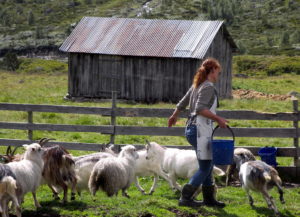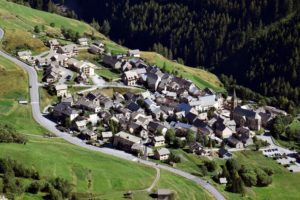Alpine Grazing Systems
Alpine grazing social-ecological systems can be considered either as vulnerable to climate change due to their biophysical and socio-economic marginality, or highly resilient due to their long history of climate variability. Adaptation pathways for these systems will depend on the ability of alpine communities to mobilize and use adaptation services: the properties of ecosystems that enable the current ecosystems and their services to persist, or to transform to novel ecosystems that supply new services.

In the southern French Alps, livelihoods and the maintenance of biodiverse, multifunctional landscapes depend on the strong interactions between farming and tourism. Local stakeholders share a vision of sustainable local development, in which agriculture and grazing continues to play an important role (“Seeds of Hope”). A scenario of re-wilding is rejected by most stakeholders. For the Seeds of Hope vision to be achieved requires the use of adaptation services (or ‘nature’s contribution to adaptation’), including the resilience of fodder production supported by dominant plant traits and functional diversity within grassland types; increased sequestration of soil carbon and the ability for functionally-overlapping grassland types to transform in response to climate and management change.

However, for these adaptation services to be expressed and support adaptation requires the identification of social factors that both facilitate and impede their use. Tipping points towards the maladaptive pathways may occur with successions of dry summers and years of poor snowfall, but are most likely to be triggered by declining physical and internet connectivity, lack of uptake of technical innovations, local conflict or changes in values of the broader society that supports livelihoods through markets for mountain products and flexible subsidies. In addition, close analysis of the ‘maladaptive’ pathway reveals some potential larger-scale benefits of carbon sequestration, water purification or conservation of iconic wildlife, which may be considered in regional-scale trade-offs and land planning.
For more information:
Bruley E, Locatelli B, Colloff M.J, Saillou N, Métris T, Lavorel S (2021) Participatory actions and leverage points for ecosystem-based adaptation pathways in a mountain social-ecological system Environmental Science and Policy 124, 567–579. https://doi.org/10.1016/j.envsci.2021.07.023
Bruley, E., Locatelli, B., Vendel, F., Bergeret, A., Elleaume, N., Grosinger, J., Lavorel, S. (2021) Historical reconfigurations of a social–ecological system adapting to economic, policy and climate changes in the French Alps. Regional Environmental Change 21, article no. 34. https://doi.org/10.1007/s10113-021-01760-8
Bruley, E., Locatelli, B., Lavorel, S. (2021) Nature’s contributions to people: coproducing quality of life from multifunctional landscapes. Ecology and Society 26(1), article no. 12. https://doi.org/10.5751/ES-12031-260112
Lavorel, S. Colloff, M.J., Locatelli, B., Gorddard, R., Prober, S.M., Gabillet, M., Devaux, C., Laforgue, D. and Peyrache-Gadeau, V. (2019) Mustering the power of ecosystems for adaptation to climate change. Environmental Science and Policy 92, 87–97. https://doi.org/10.1016/j.envsci.2018.11.010
